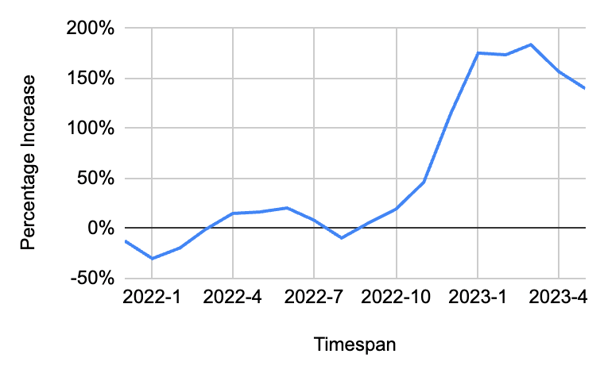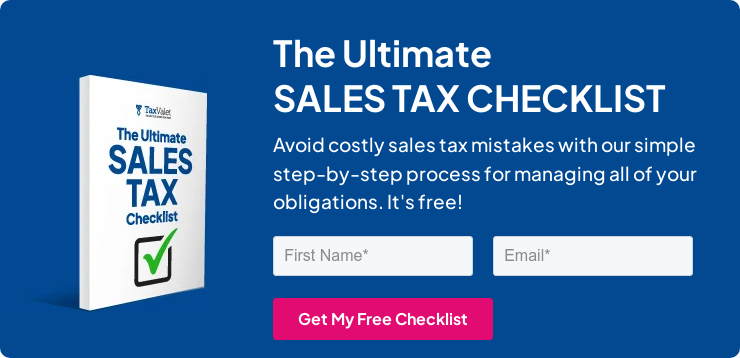One of the trickiest aspects of managing sales tax for ecommerce and SaaS businesses is keeping up with the sheer number of legislative and policy changes across every state. Laws change, policies about and efforts to conduct audits evolve and it’s nearly impossible for busy entrepreneurs to stay on top of it all.
We know sales tax can be confusing and can even keep you up at night, so we wanted to break down some of the important changes and trends we’re seeing that could impact your business.
Consider this your go-to sales tax cheat sheet as we head into 2024. Let’s dive in!
1. Sales Tax Audits Spiked in 2023
Over the past 18 months, we’ve seen a huge jump in the number of sales tax audits initiated for our clients. After chatting with other sales tax professionals, this seems to be an industry-wide trend, not just affecting our clients.
- In late 2021, less than 1% of our clients were in an active audit. Now as we turn the corner into 2024, it's jumped to nearly 4%!
- We're hearing some auditors are managing as many as 35 active audits at once. That's a lot of audits!
This spike likely comes as states look to increase revenue after reporting losses in 2023. We’ve seen many state Departments of Revenue posting more auditor job openings.
Here's a chart showing the growth rate of sales tax audits across our client base:

Don’t let audits and penalties impact your business. Learn more about our sales tax audit defense services and see how TaxValet can handle the process for you.
The Top States for Sales Tax Audits Going into 2024
California and Illinois have always been audit hot spots, and that remains true. The number of audits in these two states continues to climb. In addition, Wisconsin and Washington are also ramping up audits.
We're also seeing an increase in audits from a business's home state. Audits can feel random, but states seem focused on ensuring ecommerce businesses maintain compliance post-Wayfair, especially with Marketplace laws now in effect.
While we always advise our clients that filing multiple amended returns can increase the risk of an audit, we are regularly seeing states commence sales tax audits at random. When speaking to one auditor, he went so far as to wonder why a particular business was audited because their sales volume seemed low in comparison to other businesses they could go after.
Key Ecommerce Sales Tax Audit Focus Areas
- Use tax obligations - States are looking closely at whether use tax was paid accurately, sometimes even more closely than sales tax. Be extra mindful of paying use tax when required.
- Fixed assets & expenses - The most common use tax exposure we see relates to bigger purchases like furniture, software, and fulfillment services where sales tax wasn't paid. Consider reviewing expenses to identify any outstanding use tax obligations.
- Nexus start dates - States want to ensure the correct nexus start date was used when registering to recoup unremitted taxes.

2. Ecommerce Sales Tax Permit Registrations
We’ve seen a handful of states request additional info, seemingly at random, after registration to verify the proper start date was used. These states are:
- Arizona
- Illinois
- Maine
- Washington
- Wisconsin
South Dakota typically requires a phone call to confirm sales before issuing a permit. If the wrong start date is used, they’ll reject the application and require backdating to the correct nexus date.
Registering can be tricky -- using the wrong date risks audit exposure and liability for back taxes, but correcting to the proper date can present real financial challenges. While some businesses take the risk of using an incorrect date, with stricter state enforcement, the cost of noncompliance rises.
3. Sales Tax Legislation Changes to Know
States Eliminating Transaction Count Thresholds
Most states look at either the sales volume or number of transactions to determine if a business meets economic nexus requirements to collect and remit sales tax. Typically, these thresholds are either $100,000 in sales or 200 transactions (some states have higher thresholds as well). The transaction count hits hardest on smaller businesses that sell a lot of low-dollar item goods. In this scenario, a business may only have $10,000 or less in sales to a particular state but have well over 200 transactions, thus meeting the economic nexus in that state.
Some states have recognized this as truly unfair for smaller businesses and have begun to eliminate the transaction count as part of the criteria for economic nexus.
Examples of states that removed the transaction count threshold include:
Retail Delivery Fees
Colorado started a trend by imposing a $0.27 Retail Delivery Fee on taxable transactions delivered by vehicle. Effective July 2023, the fee only applies to businesses with over $500K in Colorado retail sales. Delivery fees have complicated implementation, with many retailers paying the fee out of pocket when sales channels can’t properly collect it.
Since Colorado’s fee, we have seen a few other states and cities (like Minnesota and New York City) follow suit with delivery fees. None have taken effect yet, but we expect further complications with sales channels struggling to adequately collect the fee.
Sales Tax Exemptions for Essential Items (Food, Baby Products and Feminine Hygiene Products)
There was a huge movement for states to exempt certain essential products such as food, baby products, and feminine hygiene products from sales tax in 2023. While most of these are permanent exemptions, there are a few states, such as California, that passed time-bound exemptions that are set to expire sometime in the future.
Gwyneth Paltrow was the name behind the push for diaper exemptions as she went so far as to create a fictional luxury baby product to raise awareness around the amount of taxes paid for diapers.
Examples include:
4. Other Notable Sales Tax Changes
- Shopify upgraded its tax calculation engine in early 2023. Now called Shopify Tax, it is much more accurate, and allows for better capture of exempt products, but also comes with a fee.
- Stripe acquired sales tax software company TaxJar and laid off a majority of its employees. This has resulted in less investment in feature development and support for the company.
- Vista Equity Partners, the largest private equity firm in the world, acquired Avalara and took them private. Anecdotally, we’re hearing that seasoned employees are being replaced with greener talent.
Fed Up with Managing Sales Tax for Your Online Business?
I hope this ecommerce sales tax update gives you the insights you need to stay compliant and dodge any audit headaches! However, if you have questions about sales tax or would like more information about our done-for-you sales tax services, schedule a free (no-obligation) introduction to TaxValet today. Our team of sales tax experts specializes in staying up to date with the latest legislative changes, and provides comprehensive sales tax services from filing paperwork to evaluating nexus to handling audits (and more), so you never have to lose sleep over sales tax again.

Disclaimer: Our attorney wanted you to know that no financial, tax, legal advice or opinion is given through this post. All information provided is general in nature and may not apply to your specific situation and is intended for informational and educational purposes only. Information is provided “as is” and without warranty.
What you should do now
- Get a Free Sales Tax Plan and see how Tax Valet can help solve your sales tax challenges.
- Read more articles in our blog.
- If you know someone who’d enjoy this article, share it with them via Facebook, Twitter, LinkedIn, or email.



